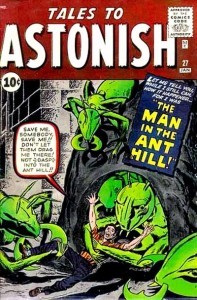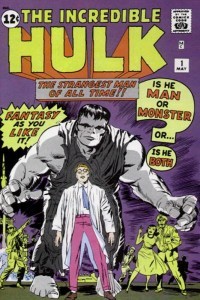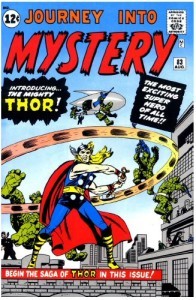Daniel Sherrier's Blog, page 45
May 28, 2015
Avenging The Fantastic, Part 1: The Marvel Comics Universe Begins!
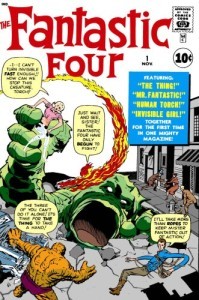 The Avengers have been around since long before the Marvel Cinematic Universe became a mainstream pop culture juggernaut. In this new series, I’ll be reading the Avengers-related titles of the original Marvel Comics Universe from the 1960s through the present over the course of many, many months, and I’ll chart my observations here every two or three weeks.
The Avengers have been around since long before the Marvel Cinematic Universe became a mainstream pop culture juggernaut. In this new series, I’ll be reading the Avengers-related titles of the original Marvel Comics Universe from the 1960s through the present over the course of many, many months, and I’ll chart my observations here every two or three weeks.
I’ll include the Fantastic Four in this, since not only is their first (hopefully) good movie coming up this summer, but they’re also a major part of the traditionally super-heroic corner of the comics universe—as opposed to the feared-and-hated characters like the X-Men and Spider-Man or vigilantes like Daredevil, though Hulk gets included on account of being a founding Avenger. (If I included those other franchises, I’d never finish.) Between the Marvel Unlimited digital library and my own collection, we’ll be able to cover most (but not all) of the books starring Captain America, Iron Man, Thor, and the like. Special thanks to The Complete Marvel Reading Order for sparing me the hard work of keeping track of what to read next.
So face front, True Believers, as we begin our long-term tour of the evolution of Marvel with this extra-sized first issue!
Fantastic Four #1-13, Tales to Astonish (starring Ant-Man) #27, 35-41, Incredible Hulk #1-6, Journey Into Mystery (starring Thor) #93-89, 91, Strange Tales (starring the Human Torch) #101-108, and Tales of Suspense (starring Iron Man) #39; years spanned: 1961-3.
Fantastic Firsts
We’re at the ground floor here, so pretty much everything is new.
Though Marvel Comics had been around in some or another since the late 1930s, Marvel continuity officially begins with the introduction of Mr. Fantastic, the Invisible Girl, the Human Torch, and the Thing in Fantastic Four #1.
The next character we meet is Hank Pym (who will be played by Michael Douglas in this summer’s Ant-Man movie) in Tales to Astonish #27, which is more a sci-fi short story about a scientist being almost done in by his own invention rather than a superhero tale. Pym becomes Ant-Man in TTA #35.
The Hulk is next in the first issue of his own series, followed by Thor in Journey Into Mystery #83. A little while later, Iron Man comes along in Tales of Suspense #39. Perennial sidekick character Rick Jones first appears in Hulk #1, and Thing’s longtime girlfriend Alice Masters first appears in FF #8. The do-little Watcher shows up in FF #13.
Notable villains introduced include the Mole Man (FF #1), the alien Skrulls (FF #2), Doctor Doom (FF #5), the Executioner (JIM #84), Loki (JIM #85), the Wizard (ST #102), and the Puppet Master (FF #8).
Marvel’s first superhero, Namor the Sub-Mariner, gets reintroduced in FF #4, though he’s mostly a bitter antagonist in this era.
The first crossover happens in FF #12, when the Fantastic Four are sent after the Hulk.
–Back then, the Hulk didn’t need to be angry for you to not like him. Bruce Banner’s transformations are initially triggered by nightfall, and he’d revert to his normal self upon sunrise. That quickly changes in multiple ways during the Hulk’s initial six-issue run.
The Hulk’s co-star is insufferable teenager reader identification character Rick Jones, whose life Bruce Banner saved when the gamma bomb went off, creating the Hulk. In #3, a trip to space results in Banner being stuck as the Hulk regardless of the time, and because back on the ground Rick is operating controls to return the spacecraft to Earth, some radiation feedback gives him the ability to control the Hulk’s actions. Radiation was magical in the 60s.
Later, Banner creates a machine to manually switch himself back and forth between his personas, and he’s even able to gain control of the Hulk’s body for a little while, though Hulk’s rougher personality soon reasserts itself, and somewhere along the way Rick loses his influence over him. However, the Hulk’s still more intelligent than the traditional “Hulk smash!” characterization we’re used to.
–Thor isn’t just Thor. He’s also a physically weak physician, Dr. Donald Blake, who discovers Thor’s hammer in Norway. By holding onto the hammer, the “lame” man can become the Norse thunder god, but if he releases the hammer for more than sixty seconds, he reverts to mortal form. The whereabouts of Blake’s personality remain unknown. And whenever Thor’s in a jam, he just needs to think a message to his father Odin on Asgard, and it’s deus ex machina to the rescue!
–Everyone loves the Fantastic Four, unless aliens are framing them or they go broke and can’t pay their bills, but that’s usually resolved within twenty-some pages.
–Superheroes were a bit less super back then. The Thing is strong enough to break a thick log with his bare fists, but it’s a tiring effort, and even the Hulk seems less incredible than we see today. The Invisible Girl doesn’t yet have her force field power.
These stories don’t hold up well by today’s standards. It’s not just that they’re dated, which they absolutely are, but they were intended primarily for elementary school–aged boys. Comics will grow up later.
The main appeal to reading these now is their historical value, not only to see the earliest versions of characters that have endured for so long but to experience facets of past decades through a pop culture lens. Nevertheless, these books have plenty of freewheeling imagination at play, unhampered by pesky little things like “scientific accuracy,” and that lends them a sort of innocent charm.
Fantastic Four is hands-down the strongest series at this point, and it was the most popular then—the first superhero book to derive as much conflict from the protagonists’ own personalities as from their evil foes. The Hulk starts out interesting enough with a “modern” Jekyll-and-Hyde premise, which gets somewhat lost in adventures with aliens and such after the first issue. And Ant-Man and Thor are pretty generic superheroes, not all that different from what DC had to offer at the time.
Iron Man’s debut issue shows some promise, though, as it reads like a very abridged version of the first half of the first movie, but with 100 percent more communism to fight and, sadly, 100 percent less Robert Downey Jr.
Culture Smash!
–Yeah, they fought quite a few commies back in the day. It was the Cold War, after all.
The quintessential Cold War issue is FF #13, which features a space race. Representing America, we have the Fantastic Four, and over in the Soviets’ corner is a maniacal Russian man and his three apes (in case young readers didn’t know communism was bad). Of course, the commie and his animals all gain super-powers as they travel through cosmic rays and become the Red Ghost and the Super-Apes. Both groups land on the moon—specifically the “Blue Area” where they find ruins of an ancient civilization and, conveniently, oxygen.
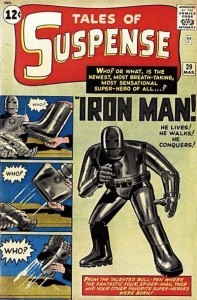 –This was also during the Vietnam War, so Iron Man’s origin story takes place in Vietnam.
–This was also during the Vietnam War, so Iron Man’s origin story takes place in Vietnam.
–Comics from the 1960s are appallingly sexist by today’s standards, but the inclusion of Sue Storm/Invisible Girl in the Fantastic Four represented significant progress, even if she does get captured a lot and tend to pine away for bad-boy Namor. She’s still an active team member, though, who occasionally plays a key role in turning the tide against the FF’s opponents.
But then we have to endure lines like this, from FF #12: “Miss Storm, a pretty lady can always be of use—just by keeping the men’s morale up!” Granted, old-fashioned General “Thunderbolt” Ross says that, but Mr. Fantastic immediately chimes in to agree.
Jane Foster and Betty Ross fare much worse than the Invisible Girl. Unlike Natalie Portman’s accomplished scientist in the movies, comics Jane is a nurse who works for Dr. Blake, and her defining character trait is that she’s in love with both Blake and Thor—not knowing they’re (gasp!) one and the same!
Jane gets a cringeworthy but mercifully brief daydream sequence in which she, no joke, fantasizes about taking care of Thor. “Nonsense! Your hammer will look more impressive polished!” I bet it will, Jane. I bet it will.
Betty basically hangs around an army base with her father, General Ross, as she worries about Bruce and faints whenever convenient.
–All superheroes are Caucasian. Most of the bad guys are, too, except the Vietnamese in Iron Man’s debut.
–The Human Torch was exposed to a lot of asbestos, the poor kid.
Trending Then
Stan Lee loved him some hyperbole. “The Human Torch battles the most fantastic foe of all! Paste-Pot-Pete and his unbeatable super-weapon!” the cover of Strange Tales #104 boasts. Yep. Paste-Pot-Pete, the most fantastic foe.
Highlights
Fantastic Four #6 – In which Dr. Doom and Namor team up to create headaches for the team, and we learn the differences in how these bad guys function in the way they’re contrasted against each other. Plus, the FF’s skyscraper headquarters being rocketed into space is a memorable visual.
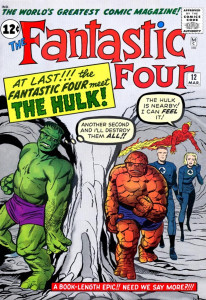 Fantastic Four #12 – The Hulk guest-appearance is the first time we’re explicitly shown we’re reading about a shared, expanding fictional universe, which makes the adventure a bit more fun than the standard fare of the era. And we witness the first Hulk vs. Thing fight.
Fantastic Four #12 – The Hulk guest-appearance is the first time we’re explicitly shown we’re reading about a shared, expanding fictional universe, which makes the adventure a bit more fun than the standard fare of the era. And we witness the first Hulk vs. Thing fight.
Tales of Suspense #39 – Iron Man’s debut, though far from a work of art, holds up about as decently as it could have. Moviegoers will recognize quite a bit.
Lowlights
Pretty much the entire Human Torch solo run in Strange Tales, which reads like Human Torch: The Hanna Barbera Cartoon. The FF definitely work better as an ensemble.
The Quotable Marvel
“That lollipop stick—it’s my only chance!” –Ant-Man, TTA #37. The movie has a high bar to meet indeed—no, wait, it only looks high from Ant-Man’s perspective.
“Weeks later, all America acclaims a new motion picture hit, little dreaming of the amazing tale behind the film! The Fantastic Four once again have the money to carry on their unique work…” –a prophetic caption in FF #9 foreshadowing the 21st century relationship between comic books and movies
“Have to be careful! I absent-mindedly almost wrote Human Torch on a deposit slip!” –Johnny Storm, already forgetting his own name in ST #104
“Only a genius such as I, Ivan Kragoff, could have trained a gorilla to operate a spaceship!” –the Red Ghost, reminding himself of his own name in FF #13
“I would take my chances with them [the Super-Apes], rather than the Red Ghost, for they are like the communist masses, innocently enslaved by their evil leaders!” –Invisible Girl, FF #13, saving red-blooded American boy readers from the commie influence (but not red-red-blooded, of course)
To Be Continued…
We’ve got one more founding Avenger to meet—the Wasp—before the team assembles. Meanwhile, Captain America is sleeping in a big ice cube underwater somewhere, awaiting the exciting, modern world of the 1960s!
May 18, 2015
Say good-bye to my little free friend
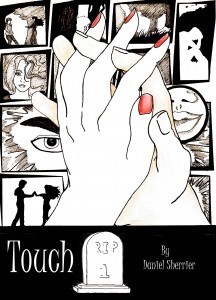 “Touch,” the first novelette in RIP: Choices After Death, has been a free standalone ebook for a good long while now, and many hundreds of you have downloaded it. But the free ride is about to come to an end.
“Touch,” the first novelette in RIP: Choices After Death, has been a free standalone ebook for a good long while now, and many hundreds of you have downloaded it. But the free ride is about to come to an end.
So Choices After Death can reign supreme as the one true RIP (at least until Volume 2 comes out), “Touch” must go. This Wednesday, May 20, I will click on the unpublish button, and this free sample will be no more.
If you want the freebie, now is the time to download. Then after you read it and realize you need more Rip and Serissa in your life, Choices After Death will be waiting for you.
May 7, 2015
Super Comics: Hawkeye #1-5 (2012)
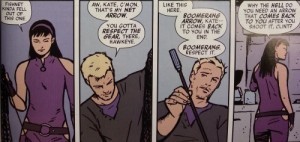 New post at Smash Cut Culture!
New post at Smash Cut Culture!
After the first Avengers movie came out, Marvel wisely promoted Hawkeye into a solo ongoing series. It’s not the first time this has been attempted, but the series that launched in 2012 is easily the most successful and critically acclaimed outing for a lone Clint Barton. Well, not entirely lone.
The series only lasts 22 issues before getting a reboot with a new creative team, and there’s nothing wrong with stopping while you’re still ahead. The place for readers to start, of course, is the first trade paperback, My Life as a Weapon, which collects Hawkeye #1-5, (plus a superfluous Young Avengers Presents #6, which is okay but we’ll just ignore it here).
These short stories show how delightfully entertaining comic books can be when they’re not muddled with intricate continuity or crossovers or big events.
As the intro says, “Clint Barton, a.k.a. Hawkeye, became the greatest sharpshooter known to man. He then joined the Avengers. This is what he does when he’s not being an Avenger. That’s all you need to know.”
April 23, 2015
There came a day, a day unlike any other…*
*I should point out Mark Twain did not actually team up with the Avengers. However, there was that time he teamed up with the crew of Star Trek: The Next Generation.
April 14, 2015
Every modern Doctor Who episode ranked from worst to best, part 4 of 4: “Fantastic!”
And here we are at last—the top 25 episodes of modern Doctor Who. If you missed the earlier installments, you can start at the bottom with “I’m Sorry, I’m So Sorry,” then progress up through “Are These Good Episodes?” and “These Episodes Are Cool.” Or, if you want to focus on the positive, see below.
Remember: Spoilers!
Without further ado, Geronimo!
“Fantastic!”

“On the bright side, we now know the TARDIS has blankets. Unless this is the dream.”
#25 Amy’s Choice: A dream-based episode where the stakes feel real. The set-up is intriguing with the characters not knowing which of the two realities is the dream, and it’s all grounded by a strong emotional core. I’m not sure how Amy fell in love with Rory back in these pre–Hitler-punching days, and that does mar the episode just a tad, but great stuff otherwise.
#24 Last Christmas: Another dreamy episode, but a totally different one: Doctor Who does Inception, guest starring Santa Claus. It’s one of those ideas that could easily have gone so wrong and yet somehow finds the sweet intersection of Christmas and sci-fi.
#23 Midnight: I wouldn’t want every episode to be like this, but this is a wonderfully tense change of pace, and one of very, very few Doctor Who episodes that could conceivably be staged as a play. All that repetition is unsettling, but it’s a good unsettling.
#22 The Impossible Planet/The Satan Pit: Black holes are a great place for mysterious forces, aren’t they? So yes, the Doctor has a chat with the Devil or something resembling the Devil, which really shouldn’t work. But throw in solid guest stars, possessed Ood, and the Doctor’s faith in his companion, and you have a winning two-patter.

And he knows how to use it.
#21 The Fires of Pompeii: A compelling time-traveler dilemma, the Doctor brandishing a water gun, and for the first time, Donna isn’t annoying—she’s actually beginning to shape up into a great character as she convinces the Doctor to save whoever he can. And who else from this episode is going to become a regular someday?
#20 Listen: The Doctor gets in touch with his own fears while Clara endures a romantic comedy. Some of the old Moffat tropes are there (Don’t let the thing under the blanket see you! So do the opposite of don’t blink!) and yet it feels so fresh and thoughtful.
#19 The Army of Ghosts/Doomsday: Rose’s farewell is so melodramatic, but it’s great melodrama. The Daleks vs. Cybermen feud couldn’t possibly live up to the cheesy awesomeness we would hope, and it doesn’t need to. The real fun is watching as the Doctor and Rose send them all flying into hell to save the world together one last time. And then that long good-bye that’s not long enough.
#18 The Girl Who Waited: As if Amy Pond didn’t wait long enough in her youth, here she’s left waiting 36 years in a “nice” place that’s constantly threatening to kill her with kindness. The result is two Amy Ponds and a heartbreaking decision on Rory’s part to save the woman he loves…and not save the woman he loves.
#17 The Christmas Invasion: In which the newly regenerated 10th Doctor saves the world in his pajamas. He’s sleeping on the job for most of the episode, which makes his eventual emergence toward the end all the more grand and thrilling. That delayed gratification pays off.

You, too, can own a miniature TARDIS for a mere $29.99.
#16 Flatline: A shrunken TARDIS yields ridiculous fun, the 12th Doctor’s best episode to date, and the most likeable and promising Clara’s character has ever been. The “Doctor-in-training” role suits her. (But did she really have to answer her phone at that moment? Does she not have voicemail?) The Addams’ Family Thing bit could have turned out so stupid, and maybe it was, but to heck with it—it’s good silly fun.
#15 Utopia: Again, I’m separating this from the rest of the three-parter (“The Sound of Drums”/“The Last of the Time Lords”) because this first part is so good. (For the other two parts, see earlier in this list. Much earlier.) Finding the Master as an old human at the end of time? Solid gold, and even better with Derek Jacobi portraying the Master and rediscovering his villainy. We needed more of Jacobi as the Master.
#14 A Christmas Carol: Moffat’s best Christmas special was his first. This is also the best adaptation/re-imagining of “A Christmas Carol” I’ve seen, though admittedly I’ve never been a big fan of the original. The show relaxes its rules a bit for the sake of holiday cheer, but it’s okay, as the result is the Doctor inserting himself into an old miser’s childhood to soften his heart.
#13 Father’s Day: Paul Cornell should’ve written more Doctor Who. Another “trying to save someone you’re not supposed to save” episode, this time with Rose and the loser father she never knew. This is how time-travel stories should be—not about time-travel, but using time-travel as a tool for a greater story. This is the type of sci-fi you could show to someone normally averse to the genre.
#12 The Pandorica Opens/The Big Bang: Then again, time-travel shenanigans and blowing up the whole universe can be tremendous fun when it’s done like this. Doctor Who shouldn’t always be this big, but this is a fine exception, and you’ve gotta love the Doctor’s bluff at Stonehenge.
#11 The Girl in the Fireplace: While I’m not exactly clear on why the Doctor is so smitten with Madame De Pompadour, this is such a clever, fun episode with a wonderful aesthetic, the question is easily forgotten.

The Iron Giant it’s not.
#10 Dalek: A single Dalek is worth a whole army in this reintroduction to Doctor Who’s most popular and enduring nemesis. This last-of-its-kind Dalek gets to become an actual character rather than cannon fodder, proving that less is more.
#9 School Reunion: The Doctor and Sarah Jane Smith reunite, and it’s great fun that also forces Rose to confront the fact that life with the Doctor has an expiration date. Plus, evil Giles.
#8 Blink: I know, I know. How could I rank this any lower #1? Well, it’s got a few little things that bug me just enough—the sudden forced romance between Sally and that guy at the end, the “no means yes” bit with her friend, and the incredibly unprofessional cop. Otherwise, though, it’s a superb episode that comes together as a fascinating, creepy puzzle, and the Weeping Angels were never a better menace than in this introductory episode. More done-in-one adventures like this would not be a bad thing.
#7 The Day of the Doctor: Yes, that’s how you do a 50th anniversary celebration. Teaming up the 10th and 11th Doctors is great fun, but playing them off John Hurt’s War Doctor takes it to the next level. While it would’ve been enjoyable seeing the 8th Doctor as the one who fought the Time War, introducing this “lost Doctor” makes sense as he can function as a stand-in for the more serious of the classic Doctors—the ones least like 10 and 11.

He’s not playing with water guns anymore!
#6 The Waters of Mars: The best of the 2009 specials by a landslide, it derives excellent tension from that old time-travel conundrum: wanting to save good people who need to die in order for history to take its proper course; the right thing to do is also the wrong thing. When the Doctor finally says to hell with the rules, it’s both heroic and terrifying.
#5 The Eleventh Hour: Moffat’s best 11th Doctor story happens to be his first. It’s also the best introduction of any modern Doctor. The fairy tale touches are a nice change of pace and give us a unique Doctor/companion dynamic, in that he was Amy’s childhood “imaginary” friend who left her waiting for more than a decade.
#4 The Empty Child/The Doctor Dances: Moffat sure knows how to make a great first impression, doesn’t he? So he peaked with his first story, but most people would love to have created a peak half as high as this one. The “Just this once, everyone lives!” ending was just what the 9th Doctor needed, and it feels earned, with the resolution established well in advance. This one’s got charm, cleverness, and excitement to spare. And let’s not forget, the Doctor was introduced to Captain Jack as “Mr. Spock.”
#3 Human Nature/The Family of Blood: David Tenant’s finest performance as the Doctor—in which he’s a far cry from the Doctor for most of it. By stripping his identity away and forcing him to confront himself with human eyes, we get a pretty darn effective character study of the Doctor. And juxtaposing the eve of World War I with the Doctor’s decision to return to a more perilous life works rather well indeed.
#2 The Doctor’s Wife: I figured Neil Gaiman would deliver a strong episode, but I underestimated how strong. It’s basically a love story between a man and his “car,” and yet it’s oddly touching—not to mention inventive, exciting, and perfectly paced. The TARDIS has been the show’s one true constant, and this episode pays due respect to that.
#1 Vincent and the Doctor: Sometimes the best stories don’t involve saving the whole universe from obliteration. The best Doctor Who story, in my mind, comes from spending time with a troubled man destined for posthumous greatness. Here, we’ve got the joy of meeting a famous historical figure, shenanigans with a misunderstood monster, wacky gadgets, reflections on seeing the world as no one else does, an opportunity to introduce kids to the paintings of Vincent Van Gogh, and a whole lot of heart. It feels like everything the original Doctor Who was meant to be, and then some.

Just chillin’ with Vincent Van Gogh.
April 8, 2015
Every modern Doctor Who episode ranked from worst to best, part 3 of 4: “These Episodes Are Cool”
Now we’re getting into the good stuff, and we still have the best stuff to look forward to. How lovely. For anyone just tuning in, I started this worst-to-best ranking of modern Doctor Who two weeks ago with the weakest episodes in “I’m Sorry. I’m So Sorry,” continued with the middling ones in “Are These Good Episodes?” and here we are now in the penultimate entry:
(Spoilers!)
“These Episodes Are Cool”

“Didn’t you tell me off just last week?”
#31 Mummy on the Orient Express: In the distant future, you’ll be able to hear Queen covers while riding a train through space. A fun episode with the Doctor trying to figure out what’s killing people in precisely 66 seconds every time—and failing several times along the way. Sure, “66 seconds” is an arbitrary countdown, but I love when the Doctor basically goes, Screw it, I’ll let it target me this time and I’ll somehow figure it all out before I die—pretty quintessential Doctor right there.
#30: The Shakespeare Code: A fun romp with Will Shakespeare and “witches.” Featuring one of the best Harry Potter references committed to film. It doesn’t break the mold, but it’s a good time.
#29 Hide: Strong guest stars anchor this clever ghost story, which of course is not actually a ghost story…and yet kind of is? I really liked the idea of traveling on the same spot through world history.
#28 Bad Wolf/The Parting of the Ways: The first modern regeneration story holds up as the best, even despite the Weakest Link and Big Brother parodies that don’t hold up so well. Yes, 9th Doctor, Big Brother was the beginning of the end for you. But once we get past that, we get Daleks, an almost-companion, Captain Jack’s first death, the Doctor choosing not to kill despite the potential ramifications, and Super-Rose. So that last one is a deus ex machina, but at least it results from Rose’s choices and actions.
#27 The Angels Take Manhattan: Okay, so the Weeping Angel Statue of Liberty does not work. Not even a little. It’s too, too much. And why can’t Amy and Rory simply travel far enough away from New York for the TARDIS to reach them? Nevertheless, it’s a great, heartfelt farewell to the Ponds. I’m not sure why Amy fell for Rory in their earliest appearances, but they’re a great couple by this point, and Amy being forced to make one last, definitive choice between her best friend and husband is fitting.
#26 Turn Left: A big What If? story about being more important than you realize, in typical over-the-top Russell T Davies fashion. The old annoying Donna is humanized, and we see how much Rose has grown after her time with the Doctor (oh, she’s just trying to save the world these days, that’s all).

Show her how it’s done, Rose.
Next week: “Fantastic!”
March 31, 2015
Every modern Doctor Who episode ranked from worst to best, part 2 of 4: “Are these good episodes?”
And we’re back for more fun with numbers as I continue ranking every modern Doctor Who episode from worst to best. I scraped the bottom of the barrel last week, so now we move on to the middling episodes. That sounds thrilling, doesn’t it? Even though I’m being critical here and these are flawed doses of the Doctor, they’re perfectly entertaining ways to indulge in 45-minute breaks from the world, but maybe only if you’ve grown tired of re-watching the best episodes too many times. I’d still take any of these over much else we find on television these days.
Now remember – Spoilers!
“Are These Good Episodes?”
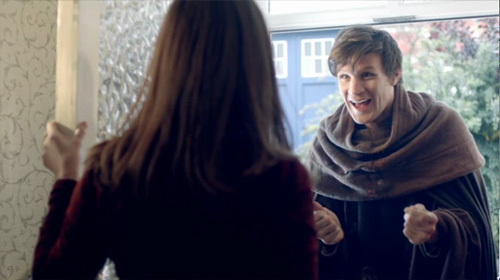
Wokka wokka!
#75 The Bells of St. John: The introduction of the “real” Clara (Clara Prime?) includes great bits, including nice scenes with the Doctor and his soon-to-be-companion plus a brief trip aboard a crashing plane. The sexism with the monks isn’t so great, nor is the idea of presenting Clara as a mystery to be solved rather than a fully formed character in her own right. And the plot about people getting trapped in wi-fi is pretty basic.
#74 The Name of the Doctor: Some cool ideas, like the Doctor visiting his own grave (the one place a time-traveler is never supposed to go—aside from pretty much anywhere in his or her own past, right?) and some incredibly poor payoff—namely, learning that Clara’s many lives existed just to keep the Doctor safe. The story feels like it needed more fleshing out for everything to work properly. Great final scene with River, though, that addresses the troubling end of “Forest of the Dead,” even if it doesn’t fix it.
#73 Gridlock: I have a heck of a time buying the premise that people would spend years in traffic traveling meters per day. A little more world-building could have clarified why they’re desperate enough to resort to travel that’s slower than walking. But the ending is wonderful, especially when the Doctor tells Martha about Gallifrey. And it is fun watching the Doctor jumping from car to car while trying not to choke on exhaust.
 “No, no — it’s okay. I don’t see any Power Ranger Daleks down there…”
“No, no — it’s okay. I don’t see any Power Ranger Daleks down there…”Next week: “These Episodes Are Cool”
March 26, 2015
Every modern Doctor Who episode ranked from worst to best, part 1 of 4: “I’m sorry. I’m so sorry.”
 The Internet likes a good list, doesn’t it? A nice comprehensive, frivolous ranking of a beloved something or other?
The Internet likes a good list, doesn’t it? A nice comprehensive, frivolous ranking of a beloved something or other?
All right then. Let’s do this. Let’s rank every episode of modern Doctor Who from worst to best in four weekly installments: “I’m sorry. I’m so sorry,” “Are these good episodes?”, “These episodes are cool,” and “Fantastic!”
I tried not to agonize over the exact rankings, because I wanted to be done this century, so assume a margin of error of plus or minus a few. If I did this a year later, the order would likely turn out differently. It’s all just my opinion, and I respect that you’ll likely disagree. (I know—how dare I rank that episode that low and that episode that high?) This is just for fun, a way to reflect on what’s been a great science fiction series overall.
I love Doctor Who even though not every episode is a winner, and I appreciate how hard it is to write for television. Both showrunners, Russell T Davies and Steven Moffat, have given us brilliant episodes, and both have been guilty of failing to rein in their excesses. Nevertheless, the show remains great on the whole, and I’m thankful for the many wonderfully entertaining hours both writers and their teams have given us.
But none of us are perfect. So in this first part, let’s get the misfires out of the way:
(Spoilers!)
Allons-y!
“I’m Sorry. I’m So Sorry.”

The Doctor as you never wanted to see him.
#97 The Sound of Drums/The Last of the Time Lords: It would’ve been much higher if I hadn’t separated “Utopia” from this three-parter. But no. That wonderful first part doesn’t deserve to be saddled with this train wreck. Both Russell T Davies and Steven Moffat have been guilty of mythologizing the Doctor, which is the wrong approach, but RTD gives us the most egregious example here. Martha travels the world convincing people to Tinkerbell the Doctor back to health, which results in a Jesus-like resurrection. No, people. He’s a runaway from a race of haughty time-travelers, not a Christ figure. And the Master’s insanity could be subtler.
#96 Love & Monsters: It benefits from an ELO soundtrack. And pretty much nothing else as our guest protagonist stalks Rose’s mother and a needlessly icky alien kills some nice people. And that girl’s really okay living as a cement face?
#95 The Doctor, the Widow, and the Wardrobe: Moffat has given us both the strongest and weakest of the Christmas specials. Here, he truly drops the ball, beginning with a credulity-straining stunt in which the Doctor dons a spacesuit while falling through space, and continuing on through…that thing with the trees and love saving everything yet again. Great final scene with the Ponds, though, but too late to save the holiday.
#94 The Daleks in Manhattan/Evolution of the Daleks: Before Andrew Garfield was Spider-Man or Mark Zuckerburg’s buddy, he was in this episode full of cheesy 1930s New York accents, pig men, and a human Dalek. You’ll believe a singer and a pig man can fall in love. Or not, more likely.
#93 The Wedding of River Song: Finishing up River Song’s character assassination is an episode in which all logic is thrown out the window. All of time is happening at once and not moving forward? How do people perceive that? It results in cool anachronistic visuals, but it makes no sense for the whole world to think it’s perpetually 5:02. What would 5:02 even mean without any other point of comparison? I’m also not clear on what the wedding actually means to River and the Doctor—if there’s any love there, when did we see it develop organically?
#92 Let’s Kill Hitler: Actually, they killed River’s character, as we receive confirmation that her whole life, including her interest in archaeology, has revolved around the Doctor. Seeing Mel regenerate into River would’ve been a great reveal if we had met Mel before this episode. That kind of forethought and set-up would’ve been brilliant, but this all feels like they’re making it up as they’re going along. On the plus side, Rory punches Hitler.
#91 The Curse of the Black Spot: It would be interesting to see Doctor Who attempt a historically accurate portrayal of pirates (sci-fi elements aside). But here we basically get a poor man’s Pirates of the Caribbean without a sufficient level of swashbuckling.
#90 Planet of the Dead: This one might work better with younger viewers, but between that goofy fanboy scientist, those aliens, a jewel thief flying a bus, it’s all leans a bit too far on the silly side, but not the right kind of silly.
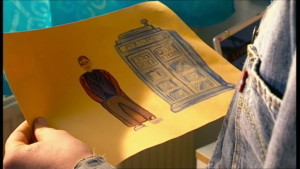 Just because television is in color now doesn’t mean…oh, never mind…
Just because television is in color now doesn’t mean…oh, never mind…Next Week: “Are These Good Episodes?”
March 23, 2015
Meet Mighty-Woman, the world’s greatest superhero!
It’s easy to say Mighty-Woman is the world’s greatest protector, but the challenge of actually being the best and living up to ever-growing expectations never ends for Miranda Thomas. When her former mentor returns to Earth after a long, self-imposed exile and steals the world’s sunlight, Miranda reunites with her old teammates—and even older friends—as they band together in an adventure that forces her to confront not only her self-centered past but the reasons she continues to serve in the present.
I’m excited to begin talking about my current work-in-progress, Terrific, which will give us a world’s greatest superhero who happens to be a 30-something fully clothed woman. That’s something pop culture needs, but it would be counterproductive if her gender was the book’s defining quality. This is a story about perseverance, friendship, and striving to do right by those who consider you a role model.
So, here’s the first full chapter. It’s still a work-in-progress, so plenty of polishing remains to be done, but I hope you enjoy.
*****
Copyright 2015 Daniel R. Sherrier. Do not reproduce without permission.
Terrific
By Daniel Sherrier
Issue #1: Perfect
“I asked nicely, but the dummies insisted on being evil,” Miranda told the police while she stood atop a pile of clobbered super-villains who had apparently competed to see who could design the most garish costume.
Miranda wasn’t Miranda in that moment, not as far as anyone present knew. To all concerned, she was Mighty-Woman, and her costume did not offend any eyeballs, perhaps because the vast majority of the law-abiding populace was biased in her favor. The gentle breeze animated the yellow cape, which matched her thin belt, fashionable boots, and large letter “M” imprinted on her shirt in a stylish calligraphy that the best graphic designers wished they had thought of. The insignia and cape complemented the magenta spandex, blending everything into a distinctive streak of scarlet whenever she’d fly off at impossible speeds.
Right now, though, the costume was in less than perfect condition. Several minor tears dotted the long pants and sleeves, and the cape had been hole-punched by unconventional fists. Scorch marks tarnished portions of the insignia, and her golden brown hair was a disaster. A careful observer might have thought a bomb had blown up in her face and subsequent action had swept away most of the ashy residue—and such an observation wouldn’t have been too far off the mark.
A crowd of pedestrians began gathering the moment Miranda deposited the unsuccessful super-villains on the sidewalk outside the police precinct in Airfield City, a major West Coast metropolis not too far from Los Angeles. The cheers commenced at once, even though not a single person here had witnessed the actual struggle. That was typical. Even in full daylight, most probably didn’t even notice the blemishes on her costume, or they’d forget them as soon as their memories could whitewash the image into the unattainable ideal of super-heroic perfection.
In their mind, Mighty-Woman was the world’s greatest superhero. Several prominent magazines had named her such for five years running—and that was an honor they had only been doing for, well, about five years, though she had already been an experienced pro well before that.
Saying she’s the world’s greatest superhero, that was the easy part. Being the world’s greatest superhero was a skosh more challenging.
From atop the heap of bad guys, smiling and waving at her appreciative audience, Miranda had but one thought: She really needed a shower.
Within the crowd—kept at a safe distance by police “caution” tape—a little girl, no older than six, slipped between the adults to reach the front. She waved a colorful piece of paper and shouted, “Mighty-Woman! I made this for you!”
Miranda glided onto the sidewalk and bent down to look the girl in the eye. She didn’t have to bend too far, as Miranda was smaller than the average woman in her mid-thirties. Hers was not a physique that suggested she could throw a tank down the block, but that sure as heck didn’t change the fact that she could. Physics went out of style years ago, or at least had become more flexible. And Miranda wasn’t looking at the girl through a mask. She discarded that impractical nuisance years ago after acquiring a more effective means of concealing her identity—fancy illusion-casting contact lenses that tweaked the shape of her face and altered the color of her hair and eyes.
“Hi, sweetie!” Big smile, she reminded herself in her post-battle fatigue, even though a grin had emerged naturally. “What’ve you got there?”
The girl handed her a crude crayon drawing of Mighty-Woman, posed quite heroically, with the words “thank you” scribbled below.
Definitely no need to force a smile. “Wow, this is perfect. Thanks!”
“You’re my favorite superhero,” the girl said, oblivious to the stench of a gazillion bad guys as Miranda gave her a quick hug.
“You are too precious,” she said in a neutral American accent. She never liked the idea of adopting some deep superhero voice, as she preferred to maintain a natural feminine tone. So as Miranda, she’d let her mild Southeastern U.S. accent roam free, while Mighty-Woman’s voice betrayed no regional origins and was an octave higher. Acting classes were useful indeed, but she would’ve sounded sincere even without them. “Now go tell your parents I said thanks for raising such an awesome young lady.”
Miranda stood back up and tossed another cheerful wave at the crowd. Just enough time to shower before work, she realized. If only water could flow at super-speed, too. However, it would’ve been impolite not to give a hand to the city’s finest who were cleaning up her mess, even if the bad guys were the ones truly responsible for the mess. So she tucked the “thank you” note securely in her belt and hoisted a too-beefy, unconscious villain over her shoulder while officers escorted the non-slumbering ones inside to issue charges.
“Mighty-Woman!” a police captain said, rushing out of the precinct. “Got a report of a situation developing in Los Angeles. It’s…unusual.”
Miranda plopped the hefty villain back onto the pavement. “Tell me how I can help.”
Alas, poor shower…
*****
Eleven years ago…
Miranda stood atop a pile of crushed robots, and she had not a scratch on her. Not even her mask or blonde wig were askew.
Flanking her on this clean Olympus City rooftop were the other two-thirds of the Terrific Trio.
“Leaping luminosity! That was terrific work, team!” Fantastic-Man said, literally glowing. His specialty was control over light, or “photonic manipulation” as he liked to call it in his authoritative TV dad voice. He could also transform his entire body into a beam of light, which was always nifty to watch.
Fantastic-Man was the world’s first superhero, predating his teammates by several weeks, and he was older than his youthful compatriots, who often got mistaken for his teen sidekicks. That was so annoying to Miranda. She was well past her teenage years—she was twenty-three, darn it! But she looked much younger next to his graying temples. He must have been thirty-five, at least. Probably older.
Amazing-Man was close to her age, she estimated, but he never enjoyed the work as much as she did. He had in the early months, but not anymore. The gray costume only accentuated his dour mood. Ditto with the full-face mask…and his slight slouch…and his stiff, crossed arms. He needed to cheer up.
“C’mon, buddy, we beat Dr. Death. Again,” Miranda told him, nudging him with her elbow. “Smile!”
He barely budged, and his tone was difficult to read without visible facial expressions. “How do you know I’m not?”
“Must be my Mighty-Vision I don’t have. You’re the one and only Amazing-Man! You move things with your brain! Enjoy it!”
Someone else was on the roof, though this guy wasn’t standing, and he wasn’t a superhero, as he had proven time and again, beginning with his choice of nickname. Dr. Death lay bound within scrap metal that had been ripped from his own robots. Yet another plot to dominate Olympus City had ended in defeat.
“Confound it,” the villain snarled through his black-and-gold helmet. “I was so close!”
“Close only counts in horseshoes, old foe,” Fantastic-Man said, ably pulling off the cheese factor as usual.
“My day will come! I merely need to find your weakest link and exploit it to the fullest!”
Fantastic-Man shone a blinding glare on the evil doctor’s face, forcing the villain to turn away. “You’ll never touch the Terrific Trio, Death.”
*****
Now…
But Dr. Death eventually did destroy the Terrific Trio, not that it did him any good, Miranda recalled as she soared through the sky on her way to further craziness. And he did it by using her best friend from high school—Kent’s friend, too. Alyssa brought about the end of the world’s first and only super-team—with the best of intentions, yeah, but good intentions didn’t improve the outcome.
No, focus on now, Miranda told herself. Not past glory days, not future relaxation, just present nuttiness.
The present nuttiness was courtesy of long-time C-list super-villain, the Puppeteer.
Four hostages were strung up like marionettes in an oversized puppetry apparatus situated on a hill behind the Hollywood sign. They were tied at the wrists, which were pulled high enough to lift their heels off the ground, and the cables were connected to a giant wooden crossbar overhead. Columns of ambiguous material propped up the crossbar, and a special lever jutted out from a column labeled “Puppet Activator!” Yes, with the exclamation mark. The Puppeteer was enthusiastic about his work…usually.
Today, however, he was brooding, which frankly looked ridiculous in his Geppetto-on-steroids costume. That thing had always failed to intimidate.
“Excuse me,” a hostage dared to say, “Mister, ah, Puppeteer…?”
“Don’t call me that.”
“Okay, um, just wondering…What are you planning on doing to us?”
The Puppeteer gazed out at Los Angeles. Somehow, he managed to refrain from blaring out his standard villainous laugh. “The last thing you’d ever expect.”
A gust of wind heralded the arrival of Mighty-Woman. Miranda was abruptly standing beside the Puppeteer, mirroring and mocking his self-important body language as she gazed out in the same direction.
“So what’re we brooding about?” she asked.
“Let me tell you a story…”
Anticipating the imminent recitation of a melodramatic speech, Miranda signaled “cut” and said, “In a hurry. Raincheck on the monologue?” She pointed back at the hostages. “You’re putting people in puppet traps again. We’ve talked about this, Puppeteer.”
The Puppeteer shook his head. “I’m not the Puppeteer.”
“Puppet trap says otherwise.”
“If you had let me give my speech…”
Miranda pointed a stern, teacherly finger at him. “I’ll allow it only if you skip to the end.”
“When I was a boy…”
“I said the end.”
The Puppeteer turned sharply toward his arch-nemesis, who never considered him her arch anything. His delivery catapulted from dead flat to hyper intense. “The Puppeteer—that joke of a villain—he may have kidnapped those poor, unsuspecting people…”
He ripped apart his gaudy carnival costume, revealing…
Oh, dear. Miranda missed the Geppetto-on-steroids look already.
“…but Mighty-Man, the world’s newest and greatest superhero, will save them!”
Miranda face-palmed. Now she really needed a shower to rinse from her eyes the image of an out-of-shape man floating in a version of her magenta and yellow tights. No, the shoulder pads did not make it more masculine. No, no.
The Puppeteer—nope, she would not think of him as Mighty-Man, no way—he rose into the air without any apparent means of propulsion. This was a new trick for a guy who had always relied on creative uses of puppet strings, but he’d probably explain in a sec. Come to think of it, maybe she shouldn’t have interrupted the monologue after all.
“I’m wearing a special costume that duplicates your powers,” he said. “I’m all the hero the people need now.”
“Save us, Mighty-Woman!”
“Quiet, hostage!” the Puppeteer barked.
Miranda rubbed the bridge of her nose. “About those hostages…”
“They’re simply bait so I can defeat you and then symbolically save them from my former self.”
“Yeah, not helping your case. Know how many hostages I’ve ever taken?” Miranda raised a fist and smirked. “This many.”
Miranda launched herself and her ridiculously strong fist at the puppet trap. She knew exactly how to handle the machine, having seen it in action several times over the years. It once turned Kent into a marionette, which was kind of adorable, even if Kent didn’t agree at the time. One good punch to the crossbar would break apart the beams and prevent the person-to-puppet energy from flowing through the “strings,” ensuring no one would experience traumatic puppetification.
But she needed to actually reach the apparatus without getting clobbered by a wannabe who was corrupting her image with every second he wore that hideous knockoff.
Mighty-Woman’s longevity had a funny side-effect. See, when you’re the only superhero with over twelve consecutive years of do-goodery, your powers get crazy embellished in the public’s mind. A scientist once went out of his way to warn her she should never move the moon from its orbit. The moon! So when someone talks about trying to “duplicate” her powers, well…she wished it was mere duplication.
The Puppeteer effortlessly intercepted Miranda’s path and clocked her across the face. The force sent her crashing into the Hollywood “D,” which then collapsed and buried her. As if she wasn’t enough of a mess already.
She pulled herself out of the wreckage and brushed the dust off her costume. The child’s drawing remained intact except for a minor tear at the edge. The Puppeteer was lucky.
“I’ll see you in my office now, Geppetto,” Miranda said as she took to the sky.
“Mighty-Man! It’s Mighty-Man!” the Puppeteer yelled as he pursued her into the clouds. “I possess—”
“I know, I know. So does my evil twin from the mirror dimension. Hasn’t improved her character any.”
He would inevitably catch up, Miranda was well aware. Something in that suit enabled him to move at even faster speeds than she could—and she could break the friggin’ sound barrier. Whatever that something was, the tights hid it surprisingly well. A shame they couldn’t hide more. (Mighty-Fact #424: Yes, kids, that’s the real reason superheroes wore capes.) Micro-circuitry woven into the fabric? Must’ve been. Anyway…A super-faster bad guy barreling straight at her? Easy one.
Miranda swerved to the side, and the Puppeteer zoomed on ahead. Maneuverability at such speeds required years of practice and muscle memory. No way those were built into the tights.
“See, you say you’re a hero,” Miranda said as the Puppeteer finally got around to reversing course, “and yet you’re acting like some medieval jouster thinking you just gotta knock me off and suddenly you’re the most fabulous one of all.”
A gust smacked Miranda in the face, and the Puppeteer was hovering inches in front of her, showing a disrespect for personal space that was too common among legally-challenged eccentrics. A cocky gleam overtook him. “Isn’t that basically what you did to Fantastic-Man?”
*****
Nine years ago…
Fantastic-Man had never done that before. Though his powers remained fully operational, he had opted not to use them now. His blue-and-amber tights and sun-shaped mask looked foolish without his usual radiance. Worse, the dullness revealed how much he had aged in the past few years as he strangled Dr. Death.
“Do you realize what you and your kind have cost me?” he raged. “Do you?”
Dr. Death collapsed onto the floor of Terrific Trio Headquarters, dead. Fantastic-Man had killed their most persistent foe in full view of his younger teammates.
The world’s first superhero had violated the unbreakable rule, and Miranda would never forget it.
*****
Now…
Miranda jabbed her knuckles into the Puppeteer’s eyes. That sure popped the bubble of his newfound cockiness.
“Ow!”
“No,” she answered. “Facts asserted on the Internet aren’t necessarily facts.”
The Puppeteer blinked several times, staring at his own hands in disbelief. “That hurt. She said I wouldn’t hurt!”
He flew away, a sonic boom assaulting Miranda’s ears, and she could no longer deny she was going to be late to work.
The hostages, meanwhile, remained strung up in the disconcerting puppet machine.
“So,” one uncomfortable lady said, “does anyone know what this thing would actually do to us?”
Miranda swooped down and severed the cables with a single swipe of her flat hand. “Turn you into tiny wooden marionettes. Painless, just…inconvenient. But hey, just think how wonderful the rest of your day will seem after all this.”
“Thank you, Mighty-Woman!”
“And thank you for your patience.”
The former hostages shook out their arms to restore circulation. They stepped aside as Miranda crumpled the apparatus with a few mighty punches. But one recently saved individual was not content to stand idly by after the indignity of being nearly turned into a puppet.
“How could you let him get away?” the irritable gentleman said, directing his full belligerence at Mighty-Woman.
No matter how powerful people thought she was, they knew she’d never hurt a fly—not unless it was an evil, evil fly, of course.
“Sir, if you’ll please calm down…”
“I will not calm down!” He sure liked to wag that finger. “Especially not after what you did to a national landmark! Hollywoo? Hollywoo?”
Miranda wanted to say so many things to this oh-so-charming fellow. But she was supposed to be perfect.
So she pumped her fist in mock excitement. “Holly-WOO!”
(Mighty-Fact #1: She was never perfect.)
“The right inflection makes everything better,” Miranda said, drifting into the air. “Hang tight, folks. Police and EMS are on the way.”
And off she flew in search of the unflattering imitation. Seeking out a newly super-strong nutjob was sure to be a real stumper, but perhaps by employing careful deductive reasoning, she just might’ve been able to suss it out. One promising lead was the stopped traffic honking at the roughly Puppeteer-sized hole in the street.
Wherever could it have led?
The sewer, obviously. And yeah, something else, too. Miranda, much to her regret over the years, knew to look below the sewer. And even if she didn’t, the stormwater spilling down that second Puppeteer-sized hole would’ve clued her in.
Miranda descended into a system of tunnels that probably hadn’t received the review of county planners. She arrived at an intersection that offered her a choice among four paths, but no reckless damage pointed the way this time. There were, however, voices, and they were plenty audible even over the pooling water she was hovering above. Plus, light was coming from only one direction. Finding the bad guys was always the easy part.
“How did she hurt me?” the Puppeteer yelled.
“Never promised invincibility,” said the flat, disinterested voice of a young woman.
“You promised I’d be every bit her equal!”
“She look invincible to you?”
“She’s Mighty-Woman!”
“Yeah. And you’re the idiot who’s forcing the premature advancement of my timetable. You were supposed to dilute the ‘Mighty’ brand over the course of weeks in preparation for my coup de grace.”
“I was supposed to be a superhero!”
“Yeah, an incompetent one, but you’ve exceeded expectations.”
Miranda floated down the tunnel, opposite the current of trickling stormwater. Everything was dry at the far end, where she found a circular gate that allowed a partial view of a derivative super-villain lair full of undecorated brick walls, depressing fluorescent lights, and all sorts of gadgets and doodads, like the comically large laser rifle that probably didn’t shoot rays of sunshine. The sink over there was labeled as a brain-scanner. The bathtub wasn’t a tub either—the sign identified it as a time machine. (It really needed to be called a Time Tub, Miranda felt strongly.) And even though that tall rectangular box looked exactly like a shower stall, complete with a handheld showerhead, no, it was in fact a miniaturization chamber.
Clearly, the stench of subterranean stormwater was not taking Miranda’s mind off her present lack of cleanliness. She hoped the stench was the sewer.
The Puppeteer was standing near the ray gun, and he was hoppin’ mad. The magenta did not do his rant any favors.
An arm in a black sleeve entered the edge of Miranda’s sightlines, and the opposite hand injected a needle into this person’s own upper biceps.
The Puppeteer brandished his mighty fist. “I wouldn’t be so disrespectful to someone who can—” As he pounded that fist onto the hard oak table, he recoiled and cried in pain. “Ow, what?”
“Deactivated,” the young lady said as she strolled onto a metal platform bolted to the floor. Miranda still couldn’t see her face, just the back of her unnaturally black hair, which had a gold streak running down the middle, a streak that continued down her cape. Even as she turned back around and fat iron shackles slammed over her boots, everything above the young lady’s black jeans was cut from view, but the familiar color scheme unsettled Miranda.
“What did I do to deserve that?” the Puppeteer whined.
Miranda ripped out the gate and zoomed into the lair in a burst of extraordinary speed—and she did so, as usual, with a great big smile on her face. “I hereby challenge the next bad guy to build a lair in the clouds.” And then she saw her new nemesis’s full costume. Yeah, familiar. “Oh, you’re kidding me.”
“Not a kidder,” the pale young woman said as she stood shackled to a humongous platform, one Miranda might have been able to rip from the ground after considerable effort. Maybe the underground fluorescents contributed to her lack of color, but makeup took it the rest of the way. This kid could’ve started yawning at any moment. “Dr. Death the Third. Hello.”
The color scheme wasn’t a coincidence then. The costume matched the original Dr. Death’s, except this new player decided to forgo the helmet or any mask. She just didn’t give a darn, clearly. And she looked so young. Was she even twenty?
“Third generation already?” Miranda said. “Really? What happened to Junior? Now that was a cute kid. For a preteen sociopath.”
“I’ll be concise,” Dr. Death III said. “I’ve injected myself with nanotechnology. Microscopic machinery is presently attaching itself to my heart. This will end in one of two ways.” An almost imperceptible smirk appeared on her face. “In eighty-three seconds, my heartbeat starts broadcasting a unique frequency that will siphon the bioelectric power of every human heart in a hundred-mile radius, giving me the power of a goddess. Or…you kill me.”
The Puppeteer grabbed the large ray gun from the table and struggled to get the right grip. “I’ll kill her. I’ll show you I’m a hero!”
Miranda ran over and bopped him on the head. “Superheroes don’t kill.” She should’ve said that before she knocked him out, she realized a second too late.
“A lie,” Dr. Death III said, her smirk growing in self-righteousness. “Your mentor killed the greatest scientific mind of the epoch.”
Aside from the description of her mentor and choice of mentor, the young villain wasn’t completely wrong. Fantastic-Man, he really did, he…
*****
Nine years ago…
“…killed him,” Fantastic-Man said as he collapsed to his knees beside Dr. Death’s fresh corpse. “I actually…”
Miranda was there with Kent and Alyssa, less than an hour after they had revealed their identities to each other. They were in costume but without their masks—something Fantastic-Man considered blasphemous, especially in their headquarters, but he had more on his mind, so much more than she or Kent had realized in more than three years of working together, more than they had ever bothered to learn.
“Fantastic-Man…?” Miranda tried.
“Don’t call me that.” Fantastic-Man draped Dr. Death’s cape over the body, using it like a funeral shroud. “The world saw us as the perfect people. We’d save everyone, and they would love us for it. But we’re not perfect. I’ve neglected my wife and son, and now…”
Fantastic-Man kneeled over the remains, and he squeezed his eyes shut, as if fighting back tears. But then his eyes popped right back open, and he turned to his team with renewed determination. His fake smile appeared almost cartoonish.
“No. I am Fantastic-Man,” he said, his glow returning. “I’ve messed up here, but I can go elsewhere. I can change into light and travel the void of space unprotected. And nothing will ever touch me again.”
His form dissolved into light so intense, Miranda had to turn away. When her eyes recovered, Fantastic-Man was gone.
*****
Now…
“Fantastic-Man was an awful superhero,” Miranda said.
She needed options fast. Fortunately, she had a lair of super-weapons at her disposal, as well as the swiftness to take inventory in less than two seconds.
A mind-swapping helmet? Useless, as was the brain-scanner. She wasn’t sure how to use the Time Tub. The giant magnet wouldn’t have worked any faster than her own super-strength, and relocating a metal platform that dense would’ve taken at least a few minutes. She could shrink this new Dr. Death with the miniaturization chamber, but there was no guarantee that would neutralize the threat…unless…
Miranda cringed at her own idea. Ew. Did she have to? Ugh, just fantastic.
But she’d need one other piece of equipment for this plan to work. She could hold her breath for that long, sure, but there was another consideration. After scouring the lair at super-speed, she didn’t find the solution.
“How do you not have a flashlight?” Miranda yelled at the smug young lady.
“I anticipated you might attempt that,” she said, her voice lapsing into a boastful tone, “so I destroyed all my flashlights.”
Miranda knew of other options for illumination. She zipped out the lair and over to a nearby movie studio. Spotting an equipment truck, she slipped inside past the crew, grabbed a headlamp, and slipped out, issuing a quick promise: “I’ll buy you a new one!”
Returning to the lair, Miranda placed the thank-you note on the floor before ducking into the miniaturization chamber. She hit the control panel, and the faucet spilled out a stream of sparkling energy that caused her skin to itch and tighten. As the chamber appeared to swell around her, she attempted to tally the number of times she had been a size other than her own, but the number quickly became too absurd. Nevertheless, experience had taught her that smaller was much less awkward than bigger. So…plus side there.
The shrinking energy cut off, leaving Miranda smaller than a gnat. She leapt into the air and flew toward the relatively massive Dr. Death III, and she tried her best not to dwell on the cavernous nose she was about to enter.
Her headlamp lighting the way, Miranda slipped down between arteries and organs until she found the beating heart, which sure looked weird and strangely fascinating at this scale, especially with the numerous techno-germs clinging to it. They vaguely resembled robotic puppies, and each one was twice Miranda’s current size.
So she went smaller than she needed to. Ah, well. More to love.
Miranda dove through the first robo-pup that was poking its snout at the muscle and releasing a charge of crackling lightning…until the critter got ripped in half, of course. The next robo-pup immediately directed its full attention to Miranda, intending to go all anti-body on her, but one punch to its face rattled the internal microcircuits, shorting them out.
Nanotech wasn’t all that durable, was it? But it was plentiful, as Miranda saw when she spun her headlamp around a full revolution. The robo-pups were converging on her, and the pack extended beyond the range of her light, even as the heart beneath their legs continued to rise and fall in one continuous earthquake.
She better get started.
While Miranda tore through robo-pup after robo-pup, she heard—and felt the vibrations of—Dr. Death III’s all-encompassing, rumbling voice: “Ten. Nine. Eight…”
The heartbeat sped up more than Miranda expected, and a beat bumped her aside, sparing the existence of a robo-pup…for another half-second.
“Seven. Six. Five. Four…”
Robo-pup number fifty-something perished, but a whole bunch remained available to pile onto her. And really, why did they have to look like puppies? Couldn’t they have had a more suitably evil appearance? Like sharks maybe? Or clowns? Shark clowns?
Despite their inconvenient puppy-ness, Miranda proceeded to demolish the whole lot. Fate of the world, and all that.
Dr. Death III concluded her countdown: “Three. Two. And one.”
The villain’s smirk evaporated when nothing happened. Well, not nothing. A miniaturized mighty-mite emerged from her nose, zipped over to hit the chamber’s gigantic buttons, and returned to her normal petite size, appearing roughly five times the mess she had before her visit to a super-villain’s interior.
The little girl’s thank-you note was undamaged. Miranda reclaimed it from the floor and tucked it away.
“Hey, look,” Miranda told the disappointed villain while masking her own fatigue. “You’re still alive. And so is everyone else. Now let me tell you about a nice little place called jail…”
*****
Shortly later…
James Smalley was an important movie director in this town, and he was displeased.
“Call her again,” he shouted at his assistant as they stood outside their star’s empty trailer. “I don’t care how a big a star she is. Even Miranda Thomas has to bother to actually show up!”
A freak gust displaced Smalley’s toupee, and a door slammed.
“Did you hear something?”
“Over your yelling?” his assistant said. “I mean…what?”
The trailer door opened, and Miranda appeared—as Miranda. Casual yet trendy clothes had replaced the costume, and no special contact lenses disguised her natural auburn hair and internationally adored facial structure. She could even allow herself to speak in her normal register. But something else required tweaking for public consumption—her personality.
“I am so sorry,” she said, appearing ridiculously embarrassed. “I had a headache, so I took some medicine, but I accidentally took the drowsy kind. How long was I asleep?”
Box office giant Miranda Thomas was no diva. America’s Leading Lady, as the entertainment media liked to call her, was a fairly decent role model to fans of all ages. She maintained a clean lifestyle, contributed to numerous charities, and logged an impressive number of volunteer hours by visiting children’s hospitals, working in food banks, cleaning up parks, and more. However, she had earned a reputation for being a teensy bit flighty.
The director stuttered. “How—when—?” But he recovered. “On the set! Now!”
Miranda hoped she didn’t smell like super-villain innards. That would’ve been embarrassing. She had taken a quick rinse, but that did not qualify as a shower.
*****
That was a shower. Well worth the wait of several hours.
Now dressed in the comfiest pajamas she ever owned, Miranda lounged on her couch and snuggled with her cat, which she named Cat as a nod to one of her favorite old films, and she watched an even older black-and-white movie. She did so within the confines of her mansion, of which she and Cat were the only inhabitants. Plenty of expensive artwork from various eras filled the space, but never enough of the space. The place met the public’s expectations of a millionaire actress’s home. Otherwise, it exceeded her needs as a person.
Miranda had enjoyed those minutes of bliss the hot shower provided. They were grand. But now what did she have?
She had a hand-made thank-you note from a grateful child who looked up to her. That was worth infinitely more than the mansion. Miranda locked it away in a chest full of similar mementos she had accumulated over the years, which had kept her going even in the toughest times. And there were lots of toughest times, especially after Fantastic-Man…
Perhaps she should check in with Kent, she decided. Ex-Terrifics Amazing-Man and Mighty-Woman were past due for another team-up, and old buddies Kent Shield and Miranda Thomas were past due to hang out. They had so much more fun without Fantastic-Man around making it all seem so…artificial.
But what Miranda didn’t know at that moment was that a beam of light was headed toward the Earth—a sentient beam of light.
*********** (End of excerpt)
If you read all the way through — thank you!
So how can you help bring this novel into the world? Simple. By supporting my current books. It’s like the original Kickstarter.
And coming after Terrific…more RIP! I’m not done with that series of Earths in Space yet. I’ve got a lot of worlds stuck in my head, but this is the one that felt like it needed to come out at this particular point in time.
March 12, 2015
Super Comics: The Walking Dead #1-6 (2003-04)
New post over at Smash Cut Culture!
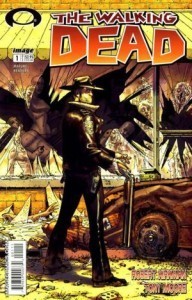 You might have heard about this little show on AMC called The Walking Dead that’s based on a comic book series of the same name, which has been going strong for something like 138 issues now.
You might have heard about this little show on AMC called The Walking Dead that’s based on a comic book series of the same name, which has been going strong for something like 138 issues now.
For now, let’s just look at those first six issues, which are collected in the Days Gone Bye trade paperback, and compare them to the first season of the AMC show, which also happened to number six episodes. SPOILERS ahead (but just for that first season/first TPB).
Though they are different beasts, the similarities don’t end there.
The comic was created by writer Robert Kirkman and artist Tony Moore. Kirkman has written every issue of series, though Moore left after issue #6, and Charlie Adlard has kept things going from then on. The television show was brought to life by of Shawshank Redemption fame (though he’s no longer the showrunner), and Kirkman has written some of the episodes.
That short first season of television is a mixed bag. The pilot episode is masterful. The second episode has some great tension. And then it’s a steady slide into mediocrity from there. The comic is more consistent in its quality level, though reading the first issue after watching the pilot makes the source material feel like the abridged version. An hour-long television show simply has much more room to breathe than a 20-or-so-page comic.

